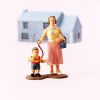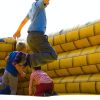-
 +26 +4
+26 +4New Jersey mother says she drowned her children in a bathtub for ‘religious purposes’
Naomi Elkins said she ‘counted to 50 multiple times to ensure she held them underwater for enough time’
-
 +1 +1
+1 +1Simple Ways to Get Your House Ready for Grad Parties
May is just around the corner, meaning it’s time for graduation and grad parties. It's been an odd year but you still want to celebrate your grad! No doubt your grad has probably kept you busy through the year with many different preparations for getting to the big day. All the things that surround and lead up to the ceremony can quickly become overwhelming or stressful, including throwing a graduation party to celebrate the grad with family and friends. Have no fear we are here to help with some grad party prep tips to get your home ready to receive visitors and congratulate your grad on a job well done.
-
 +31 +4
+31 +4TikTok, Facebook and YouTube sued by New York City for alleged harm to kids’ mental health
The suit alleges that Meta, Snap, ByteDance and Google knowingly “designed, developed, produced, operated, promoted, distributed, and marketed their platforms to attract, capture, and addict youth, with minimal parental oversight.”
-
 +50 +6
+50 +6The CEOs of Meta, X, TikTok, Snap, and Discord will testify before the US Senate on child safety
Senators are pushing for child safety laws online.
-
 +35 +12
+35 +12Georgia Restaurant Goes Viral After Charging Parents a $50 Fee for Poorly Behaved Children
Is your child known to act up at dinner? You may want to avoid Toccoa Riverside Restaurant, as it charges an extra fee for poorly behaved children.
-
 +1 +1
+1 +1Balancing Screen Time: How to Limit Screen Addiction in the Family
One of the common issues of living in the modern era is screen addiction. It is common in children, teens and adults as well. As spending too much time in front of a screen has adverse effects on child development, parents have an essential role in balancing screen time and limiting screen addition in the family. Keep reading to learn more about how to do that efficiently. Spending too much time on different kinds of screens adversely affects people, especially children in development. Excessive screen time can also cause addiction and behavioural issues. If we manage it well, we can prevent it from happening. We can do that by planning our
-
 +56 +5
+56 +5Sci-fi books are rare in school even though they help kids better understand science
Despite their scarcity, science fiction books are highly sought after by elementary school students.
-
 +37 +5
+37 +515-year-old social media influencer who claims her parents ripped her off inspires Illinois law allowing kids to sue
"The rise of social media has given children new opportunities to earn a profit,” Sen. David Koehler said. “Many parents have taken this opportunity to pocket the money.”
-
 +22 +4
+22 +4Children who start reading for pleasure early had better academics, mental health as teens: study
Researchers say children who start reading for pleasure early in life could end up with better test scores and mental health outcomes as teenagers.
-
 +23 +5
+23 +5Taxpayers shouldn’t be paying for religious schools
The Oklahoma Statewide Virtual Charter School Board’s recent decision to allow a Catholic archdiocese to operate a public school is both illegal and unconstitutional. I’m not exaggerating — I’m just reading. A charter school “shall be nonsectarian in its programs, admission policies, employment practices, and all other operations,” Oklahoma law states.
-
 +10 +3
+10 +3'I can't say my own name': The pain of language loss in families
Mithu Sanyal never learned her father's native language, Bengali, as a child. Is it too late to reclaim it?
-
 +3 +1
+3 +1Kids Are Behind in School. How Can We Help?
Emotional regulation skills set the stage for closing the learning gap.
-
 +3 +1
+3 +1Study identifies processes linking parent's anxious overprotection to reduced academic confidence in their children
New research sheds light on how parents’ tendency to be overly anxious and protective affects their child’s academic performance in college. The study, published in the Journal of Social and Personal Relationships, identifies several interpersonal and intrapersonal processes that play a key role in linking parental overprotection to reduced academic confidence.
-
 +10 +2
+10 +2Giving kids no autonomy at all has become a parenting norm. The pandemic is making this worse
Teaching children independence breeds confidence and social skills. Why aren’t we encouraging this?
-
 +17 +3
+17 +3How Parents’ Personalities Shape Children’s Lives
Study reveals how a parent's personality type can influence and shape the lives of their children, for better or worse.
-
 +10 +2
+10 +2New Research Shows Why Kids Need Play for Mental Health
Has our drive to protect our children impaired their mental health—and made our conversations with them less rich? Recently Dr. Peter Gray, a psychology professor at Boston College and prominent researcher on child play, alerted me to his recent article exploring exactly this question. The article, in-press as of March 2023 in the Journal of Pediatrics, and written along with David F. Lancy of Utah State and David Bjorlung of Florida State, comes to startling conclusions.
-
 +14 +4
+14 +4Women carry babies for lower energetic cost than men, study finds
A new study examining how much energy males and females spend carrying babies in different positions reported that women expend less energy carrying their babies than men in all carrying positions. Carrying a baby on one’s back was the most energy efficient and people carrying babies this way were able to maintain their unloaded walking speeds. The study was published in Evolutionary Human Sciences.
-
 +1 +1
+1 +1Efficient Time Management that Can Free Up More of Your Busy Schedule: Advice Intended for Working Parents - VLANFINITY
Do you want to learn how to better organize your time as a working parent? Is it common for you to feel like there aren't enough hours in the day? Then you should definitely read this article about efficient time management for busy parents. We've got you protected in every way, from setting priorities to handing off work. Get some tips on how to better manage your time by clicking the link.
-
 +18 +3
+18 +3New study disputes the birth order theory that later-born are "born to rebel"
Those born later in a family may not be "born to rebel," as posited by some researchers. A new study published in Personality and Individual Differences found later-born individuals are not more likely to have tattoos, and although they do test higher in measures of risk-taking and sensation seeking, they did not demonstrate a higher need for uniqueness.
-
 +15 +1
+15 +1Mothers who feel unworthy of being loved have less supportive responses to child distress
A study of low-income mothers showed that those with more attachment anxiety (i.e., mothers feeling unworthy of being loved) tended to show more unsupportive reactions to their children’s distress and to attribute child’s distress (e.g., crying) to the negative qualities of the child. The study was published in the Journal of Child and Family Studies. ...
Submit a link
Start a discussion




















